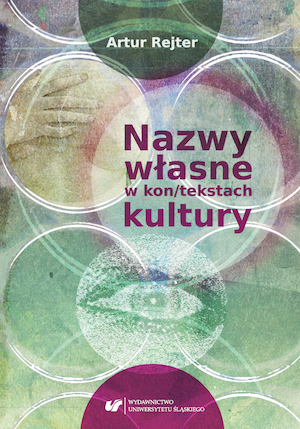Nazwy własne w kon/tekstach kultury
Proper Names in Con/texts of Culture
Author(s): Artur Rejter
Subject(s): Language studies, Language and Literature Studies
Published by: Wydawnictwo Uniwersytetu Śląskiego
Summary/Abstract: In this work, the author presents a firm conviction that proper names are specific cultural signs in terms of both understanding the culture’s historically varying dynamics and character, as well as diverse contexts in which proper names occur at a given stage of sociocultural development. Such an approach gives rise to certain revaluations in the analytic methods employed and – in a broader sense – the very essence of proper names. More frequently and definitely, contemporary onomastics seems to depart from traditional – and often orthodox – approaches, not only in terms of methodology but also objectives that the researchers set.The monograph provides various takes on the opportunities that onomastics along with its diverse instruments gives us. It is, however, worth highlighting that onomastics is understood as a field of linguistics that has a long established position and yet is subject to ceaseless methodological revaluations. We ought to expect that opening the onomastic reflections to other methods and pointing to their inter- and transdisciplinary implications may provide us with interesting effects and become an inspiration for further research.The reflections gathered in this book have been assigned to issues that constitute five themes; these themes reflect the author’s interests concerning the proper names related issues.The first group encompasses the texts touching upon the general, theoretical, and synthesising issues; to specify, it encompasses the author’s proposals of approaching onomastic issues with regard to the achievements of contemporary linguistics. These approaches attempt to propose research paths widening the scope of current perspectives. The next part gathers the onomastic re-interpretations of literary works from previous epochs (mainly baroque, but also positivism and the 20th century). The third part is comprised of the texts that place onomastics in the context of gender studies, which seems to be a rare in Polish linguistics. The question of onomastic analyses of pop-cultural texts is yet another rarity. The fourth part is therefore devoted to this issue. The monograph ends with two texts functioning as a reconnaissance, concerned with chosen thematic problems in ideonymy and zoonymy (part five). They should be treated as sui generis elaboration of the main issues tackled in the book.The author has always endeavoured to put the observed onyms in a greater perspective; they are thus socioculturally contextualised, regardless of whether the observation includes theoretical issues or the empirical dimension of the onomastic analyses in specific texts and communicational spaces. The presented research proposals mainly concentrate upon possibilities of onomastic research as complementary to other domains of contemporary linguistics. What is valorised here are mainly various spaces of text linguistics, such as stylistics, linguistic genology, or discourse theory, but the author also turns to a field dear to him – historical linguistics. Therefore, a proper name here is always a sign that focuses – like a lens – tendencies and tropes of wider fields, that is, sociocultural spaces.
Series: Językoznawstwo
- E-ISBN-13: 978-83-226-3446-2
- E-ISBN-10: 83-226-3446-2
- Print-ISBN-13: 978-83-226-3445-5
- Print-ISBN-10: 83-226-3445-5
- Page Count: 316
- Publication Year: 2019
- Language: Polish
- eBook-PDF
- Table of Content

